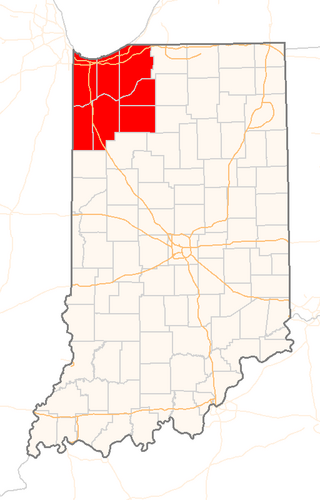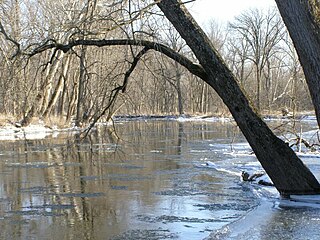Related Research Articles

The Kankakee River is a tributary of the Illinois River, approximately 133 miles (214 km) long, in the Central Corn Belt Plains of northwestern Indiana and northeastern Illinois in the United States. At one time, the river drained one of the largest wetlands in North America and furnished a significant portage between the Great Lakes and the Mississippi River. Significantly altered from its original channel, it flows through a primarily rural farming region of reclaimed cropland, south of Lake Michigan.
The Indiana Department of Natural Resources (DNR) is the agency of the U.S. state of Indiana. There are many divisions within the DNR and each has a specific role. The DNR is not only responsible for maintaining resource areas but also manages Indiana's fish and wildlife, reclaims coal mine ground, manages forested areas, aids in the management of wildlife on private lands, enforces Indiana's conservation laws, and many other duties not named here. According to the department's website, their mission is "to protect, enhance, preserve, and wisely use natural, cultural, and recreational resources for the benefit of Indiana's citizens through professional leadership, management, and education".
Potato Creek State Park is an Indiana state park located in north-central part of the U.S. state of Indiana about 12 miles (19 km) southwest of South Bend. Potato Creek is open year-round and supports various activities and facilities, including fishing, hiking, camping and mountain biking. Natural habitats include the 327-acre (1.3 km2) Worster Lake, old fields, mature woodlands, restored prairies, and diverse restored wetlands. Each offers different opportunities for plant and wildlife observation. The northeast corner has been designated "Swamp Rose Nature Preserve"; now about 1 square mile is either wetlands or in Worster Lake. Potato Creek receives about 570,000 visitors annually.

Brown County State Park is located in the United States in the center of the southern half of the state of Indiana. The park is by far the largest of 24 state parks in Indiana, and occupies 15,776 acres (63.84 km2)—making it one of the larger state parks in the United States. It is among Indiana's most visited state parks with about 1.2 million visitors annually. Although Bloomington, Indiana, is the closest city, the park is closer to the small town of Nashville in Brown County. Brown County is named for General Jacob Brown, who fought in the War of 1812 and became Commanding General of the United States Army.

Fort Harrison, sometimes called Fort Ben, is an Indiana state park located in Lawrence, Indiana, United States, and occupies part of the former site of Fort Benjamin Harrison. The park features a former Citizen's Military Training Camp, Civilian Conservation Corps camp, and World War II prisoner of war camp. There are also picnicking and walking/jogging trails including a connection to the Fall Creek Greenway. The park receives nearly 900,000 visitors annually.

Northwest Indiana, nicknamed The Region after the Calumet Region, is an unofficial region of northern Indiana, United States that is located at the northwestern corner of the state. Though there is no official definition of the region, it is based on the Gary, Indiana Metropolitan Division, which comprises Jasper, Lake, Porter and Newton counties in Indiana, and the Michigan City-La Porte, IN Metropolitan Statistic Area, which comprises LaPorte, with unofficial definitions also including Starke and Pulaski counties. This region neighbors Lake Michigan and parts of it are in the Chicago metropolitan area. According to the 2020 Census, the largest definition of Northwest Indiana has a population of 866,965 and is the state's second largest urban area after the Indianapolis Metropolitan Area. It is also the home of the Indiana Dunes, parts of which have been preserved through conservation efforts. The town of Ogden Dunes houses the Hour Glass, a museum showcasing the ecological and conservation efforts of O. D. Frank.

Northern Indiana is a geographic and cultural region that generally comprises the northern third of the U.S. state of Indiana and borders the states of Illinois to the west, Michigan to the north, and Ohio to the east. Spanning the state's northernmost 26 counties, its main population centers include Northwest Indiana, Michiana, and the Fort Wayne metropolitan area.

The Wisconsin Department of Natural Resources (WDNR) is a government agency of the U.S. state of Wisconsin charged with conserving and managing Wisconsin's natural resources. The Wisconsin Natural Resources Board has the authority to set policy for the WDNR. The WDNR is led by the Secretary, who is appointed by the Governor of Wisconsin. The WDNR develops regulations and guidance in accordance with laws passed by the Wisconsin Legislature. It administers wildlife, fish, forests, endangered resources, air, water, waste, and other issues related to natural resources. The central office of the WDNR is located in downtown Madison, near the state capitol.

Tippecanoe River is a state park in Pulaski County, Indiana, United States. It is located 58 miles (93 km) south-southwest of South Bend, Indiana. It was formed in 1943 when the National Park Service gifted the land to Indiana's Department of Conservation land to form a state park; other land along the river becoming the Winamac Fish and Wildlife Area.

The California Department of Fish and Wildlife (CDFW), formerly known as the California Department of Fish and Game (CDFG), is an American state agency under the California Natural Resources Agency. The Department of Fish and Wildlife manages and protects the state's wildlife, wildflowers, trees, mushrooms, algae and native habitats (ecosystems). The department is responsible for regulatory enforcement and management of related recreational, commercial, scientific, and educational uses. The department also prevents illegal poaching.
The Iroquois County State Wildlife Area is an Illinois state park that occupies 2,480 acres (1,004 ha) in northeastern Iroquois County, near the border with Indiana. The nearest municipality is Beaverville, Illinois, and the nearest exit on a limited-access highway is Exit 302 on Interstate 57.

A conservation officer is a law enforcement officer who protects wildlife and the environment. A conservation officer may also be referred to as an environmental technician/technologist, game warden, park ranger, forest watcher, forest guard, forester, gamekeeper, investigator, wildernessofficer, wildlifeofficer, or wildlife trooper.
The Kankakee Fish and Wildlife Area is situated in Starke County at the junction of the Yellow River with the Kankakee River. The state purchased 2,312 acres (9.36 km2) of marshland in 1927 for a Works Progress Administration (WPA) transient camp. The camp consisted of up to 400 men. After the camp closed, it was established as a game preserve. In the 1950s waterfowl management was begun. In 1982 another 1,016 acres (4.11 km2) were added and in 1992 an additional 767 acres (3.10 km2). The Fish and Wildlife area consist of the wetlands between the Yellow River and the Kankakee at their junction and uplands on both the north bank of the Kankakee and the south bank of the Yellow. The main entrance to the area is on Indiana State Road 39 at Indiana State Road 8.

Hardy Lake, originally named Quick Creek Reservoir, is an Indiana state reservoir in Scott and Jefferson counties, Indiana. It is located four miles (6 km) east of Austin, Indiana and 35 miles (56 km) north of Louisville, Kentucky. It is the smallest reservoir maintained by the state of Indiana, measuring 2,448 acres (9.9 km2) of total property, and 741 acres (3.0 km2) of surface area for the lake. The lake is approximately 38 feet (12 m) deep.
Winamac Fish and Wildlife Area is a protected area dedicated to providing hunting and fishing opportunities while maintaining 4,770 acres (1,930 ha) of oak forest and upland fields. It is located on U.S. Route 35, north of Winamac, Indiana.
Ackley Lake State Park is a public recreation area located four miles southwest of Hobson, Montana. The state park covers 290 acres (120 ha) centered around 160-acre (65 ha) Ackley Lake. The Little Belt Mountains and Snowy Mountains are visible on the horizon. The park is operated by the Montana Department of Fish, Wildlife and Parks on land leased from the Montana Department of Natural Resources and Conservation.
References
- ↑ Indiana Recreation Guide; Indiana Department of Natural Resources; Indianapolis, Indiana; 2012
- ↑ Schneider, Karl. "Indiana permanently protects 4,000 acres with new southern Indiana fish and wildlife area". The Indianapolis Star. Retrieved 2024-12-31.
- ↑ "Busseron Creek Reimagined: A Journey of Restoration". ArcGIS StoryMaps. 2024-12-10. Retrieved 2024-12-31.